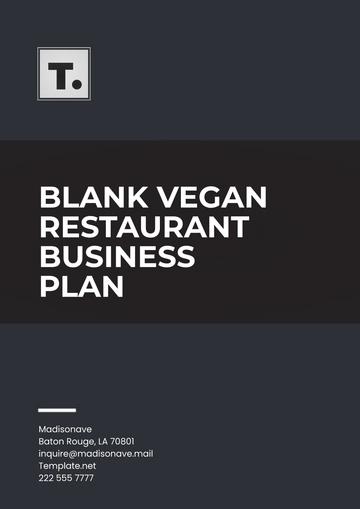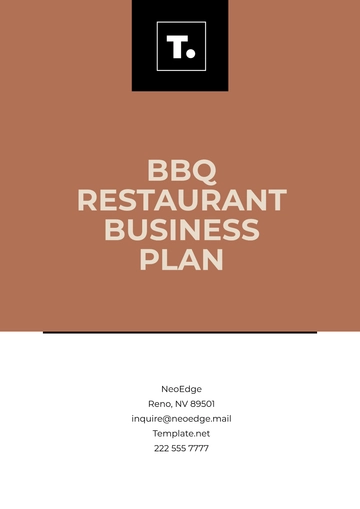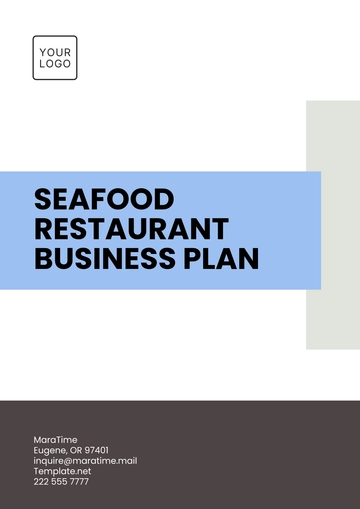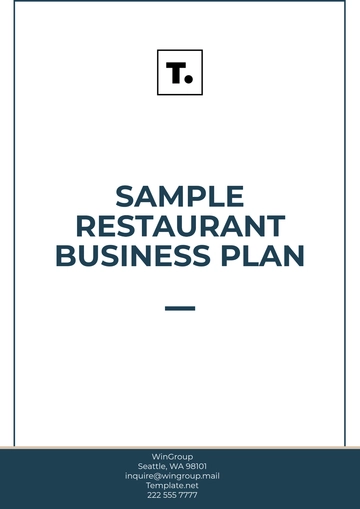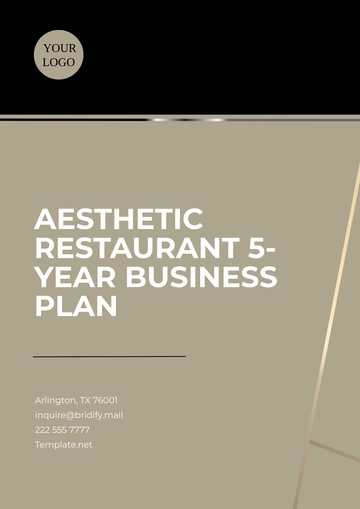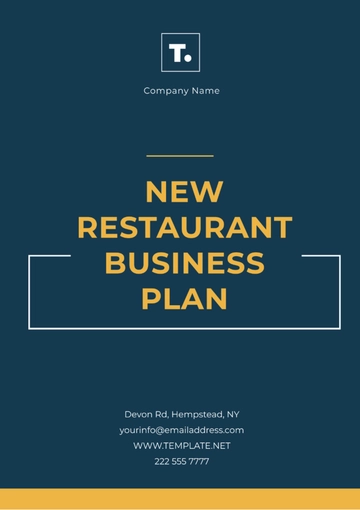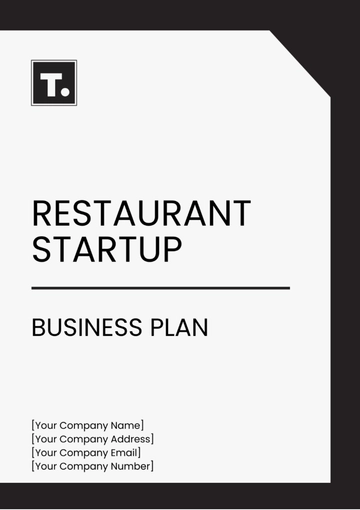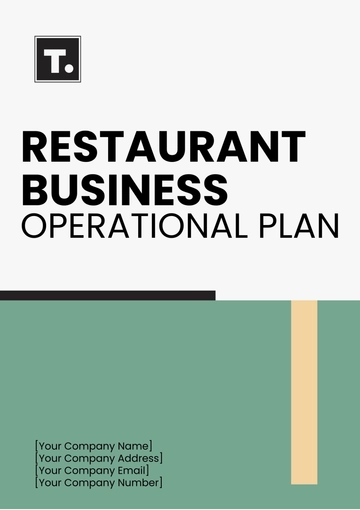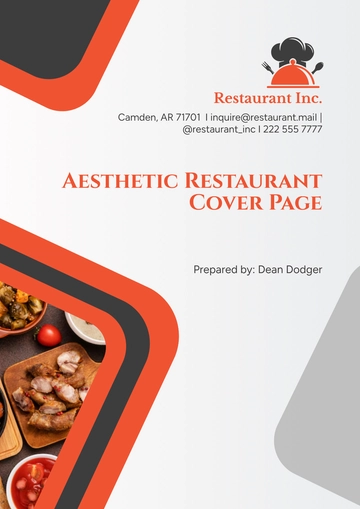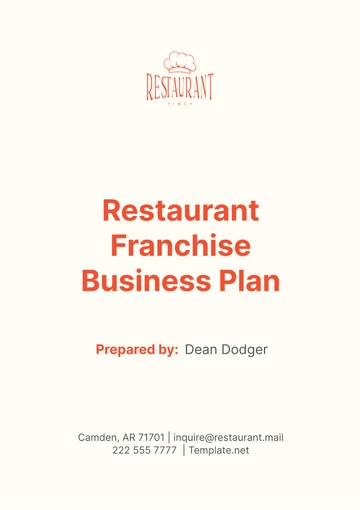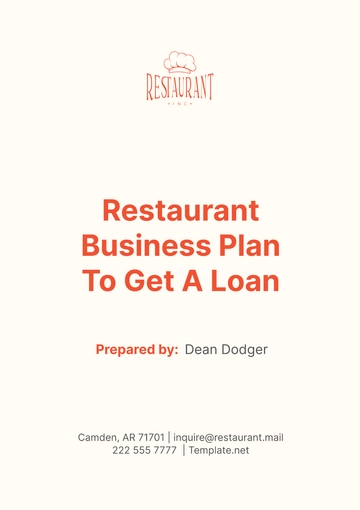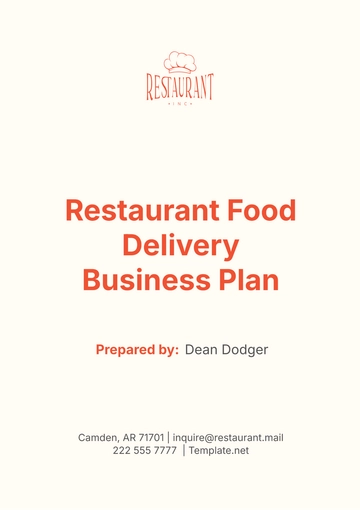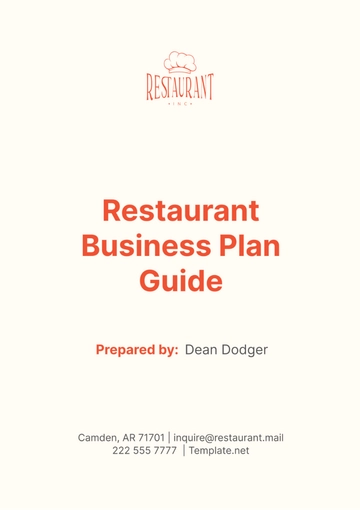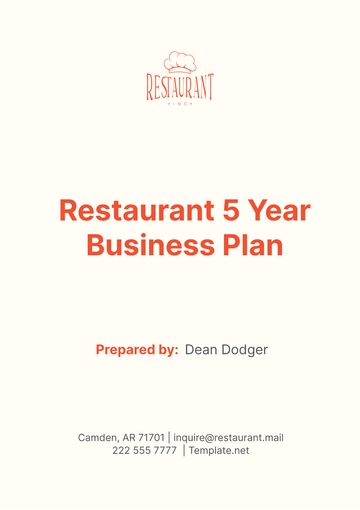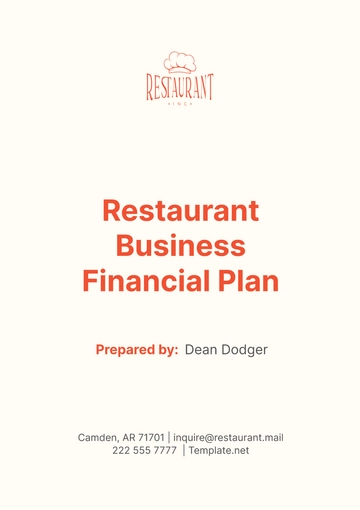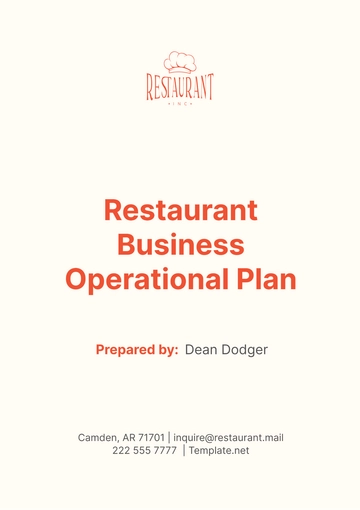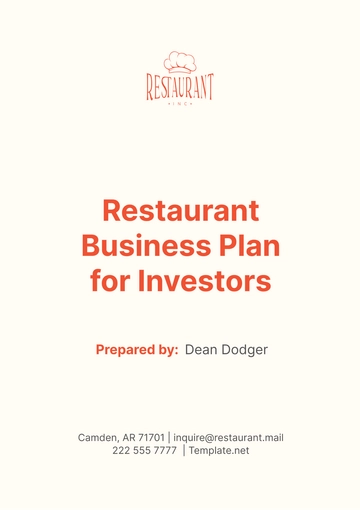Free Sample Restaurant Business Plan
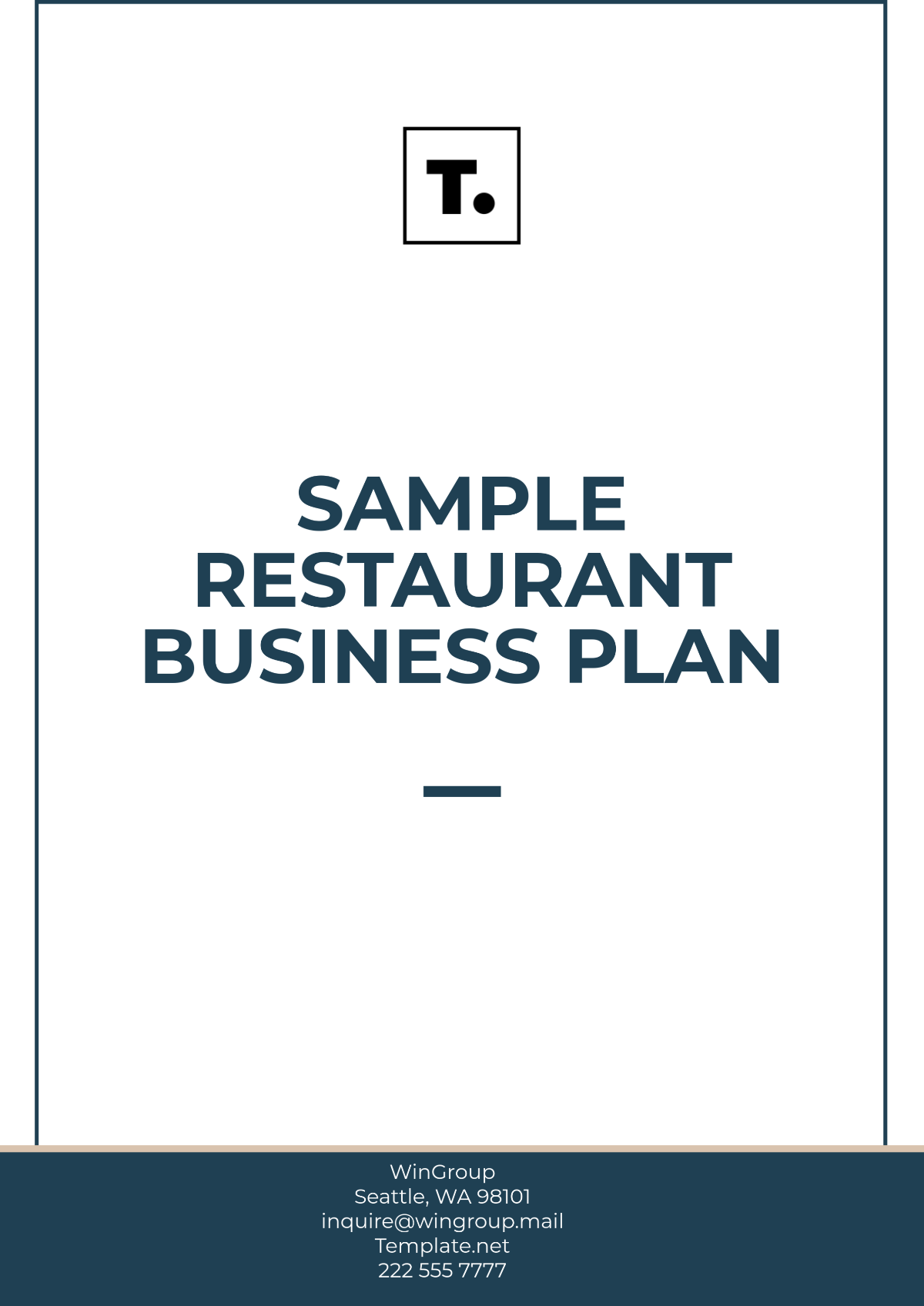
Prepared by: [Your Name]
Company: [Your Company Name]
Date: [Insert Date]
I. Executive Summary
Business Name: [Your Company Name]
Location: [Your Company Address]
Owner(s): Sarah Johnson and Michael Lee
Business Type: Full-Service Restaurant
Mission Statement: To provide exceptional dining experiences by offering high-quality cuisine, excellent customer service, and a welcoming atmosphere
Vision Statement: To become a recognized and beloved dining destination in Springfield, known for our innovative plant-based dishes and exceptional service.
Overview:
[Your Company Name] will be a full-service restaurant specializing in innovative, plant-based cuisine. Located in the heart of Springfield, it will cater to health-conscious diners, vegetarians, vegans, and anyone seeking a unique dining experience. Our mission is to create a warm, inviting space where the community can enjoy delicious, sustainable meals that are both healthy and satisfying.
II. Business Description
Concept and Theme:
[Your Company Name] will offer a modern dining experience focused on plant-based cuisine. The restaurant will feature a rotating menu of seasonal dishes that highlight locally sourced ingredients, all served in an elegant yet approachable atmosphere.
Target Market:
Our target demographic includes:
Age range: 25-55
Income level: Middle to upper-middle class
Interests: Healthy eating, sustainability, and dining out.
Unique Selling Proposition (USP):
[Your Company Name] will stand out by offering:
A unique, fully plant-based menu.
Locally sourced and organic ingredients.
An eco-friendly dining experience, including zero-waste practices and sustainable packaging.
III. Market Analysis
A. Industry Overview:
The restaurant industry in Springfield is thriving, with plant-based dining experiencing an annual growth rate of 6.7%. The demand for vegan and vegetarian options continues to grow as more consumers adopt healthier and more sustainable lifestyles.
B. Competitive Analysis:
Our main competitors include:
The Vegan Table: Known for its casual dining and comfort food. [Your Company Name] will differentiate itself by offering a more upscale and refined dining experience.
Garden Eats: Specializes in organic salads and juices. [Your Company Name] will stand out with its diverse, full-course menu featuring gourmet entrees and desserts.
C. Market Opportunities:
Increasing demand for plant-based dining options.
A lack of upscale, vegan-friendly restaurants in Springfield.
Growing consumer interest in sustainability and locally sourced food.
IV. Marketing and Sales Strategy
A. Marketing Objectives:
Achieve a monthly customer base of 1,000 diners within the first six months.
Build a strong social media presence with 5,000 followers on Instagram within the first year.
B. Promotional Strategies:
Social Media Campaigns: Regular posts on Instagram and Facebook featuring high-quality photos of menu items, behind-the-scenes content, and customer testimonials.
Local Partnerships: Collaborating with Springfield Farmers Market and local organic farms for fresh ingredients and joint promotions.
Grand Opening Event: Hosting a free tasting event with live music and giveaways to introduce the restaurant to the community.
Loyalty Program: Offering discounts and free items to customers who join our membership program.
Operations Plan
A. Location and Facilities:
Address: [Your Company Address]
Size: 2,500 sq ft, seating capacity for 75 guests.
Facilities include a modern kitchen, a stylish dining area, and a small outdoor patio for seasonal seating.
B. Hours of Operation:
Monday to Thursday: 11:00 AM – 9:00 PM
Friday to Sunday: 11:00 AM – 10:30 PM
C. Staffing Plan:
General Manager: 1
Head Chef: 1
Sous Chefs: 2
Wait Staff: 6
Dishwashers: 2
D. Suppliers:
We will source ingredients from Springfield Organic Farms, Green Harvest Co., and Fresh Fields Wholesale.
V. Financial Plan
A. Startup Costs:
Rent and Deposits: $25,000
Renovation and Interior Design: $50,000
Equipment and Supplies: $40,000
Marketing Budget: $10,000
Initial Inventory: $5,000
B. Revenue Projections:
Month 1-3: $30,000 per month
Month 4-12: $50,000 per month
Year 2: $700,000 annually
C. Break-even Analysis:
We anticipate reaching the break-even point by month 8, with an estimated monthly revenue of $42,000.
D. Funding Requirements:
We are seeking $100,000 in funding from small business loans and personal investments to cover startup costs and initial operations.
VI. Management Team
Owner(s):
Sarah Johnson: Culinary graduate with 10 years of experience in plant-based cooking and restaurant management.
Michael Lee: Experienced entrepreneur with a background in business operations and marketing.
Key Staff:
Head Chef: Maria Lopez, with 15 years of experience specializing in plant-based and gourmet cuisine.
General Manager: David Carter, known for his expertise in restaurant operations and customer service.
VII. Appendix
Menu Sample:
Appetizers:Roasted Cauliflower Bites with Spicy Tahini Sauce - $10
Stuffed Mushroom Caps with Cashew Cream - $12
Entrees:
Wild Mushroom Risotto with Truffle Oil - $18
Grilled Eggplant Parmesan - $20
Desserts:
Vegan Chocolate Lava Cake - $9
Seasonal Fruit Tart - $8
Design Concept:
The interior will feature a modern design with natural wood accents, potted plants, and soft ambient lighting to create a cozy yet elegant atmosphere.Financial Projections:
A detailed breakdown of revenue and expenses is available in the attached spreadsheet.
- 100% Customizable, free editor
- Access 1 Million+ Templates, photo’s & graphics
- Download or share as a template
- Click and replace photos, graphics, text, backgrounds
- Resize, crop, AI write & more
- Access advanced editor
You may also like
- One Page Business Plan
- Coffee Shop Business Plan
- Restaurant Business Plan
- Food Business Plan
- Real Estate Business Plan
- Executive Summary Business Plan
- Cover Page Business Plan
- Nonprofit Business Plan
- Daycare Business Plan
- Construction Business Plan
- Startup Business Plan
- Medical Business Plan
- Bakery Business Plan
- Service Plan
- Hotel Business Plan
- Catering Business Plan
- School Business Plan
- Healthcare Business Plan
- Transportation Plan
- Sports Plan
- Car Wash Business Plan
- Salon Business Plan
- Clothing Business Plan
- Farming Business Plan
- Boutique Plan
